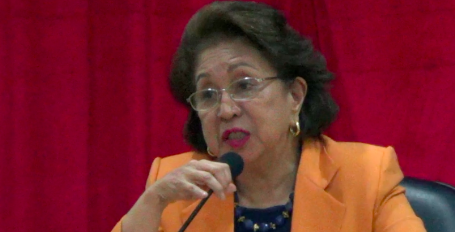Delayed? Ombudsman tells courts to ‘mirror themselves’
MANILA — “Why don’t they look at the Sandiganbayan? Why don’t they look at the regional trial courts? Why don’t they look at the Supreme Court” Ombudsman Conchita Carpio Morales exclaimed. “Mirror themselves!”
Morales on Monday expressed “frustration” at the Sandiganbayan’s dismissal of high-profile cases on grounds of unreasonable investigation delays, without looking at their merits.
Morales broke her silence in an interview with CNN Philippines anchor Pinky Webb, three months after last granting an interview with beat reporters on Jan. 25.
In the television interview, Morales admitted to feeling “frustrated” that only her office seemed to be scrutinized for alleged delays, when the Constitution mandated the speedy disposition of cases at all levels including the judiciary.
“Sometimes, I indulge in self-pity. Why do they look at the Office of the Ombudsman for inordinate delay? They are only looking at the Ombudsman,” she exclaimed.
Article continues after this advertisementShe also bemoaned that cases involving millions of pesos get “nipped in the bud” instead of being subjected to a trial on their merits.
Article continues after this advertisementNo reason to junk cases
“Of course, I’m frustrated. It’s just natural that I’m frustrated. The trouble is, we feel very strongly about the merits of the case. They involve millions, billions,” she said. “But, the case is nipped in the bud when the trial court just dismisses the case because of inordinate delay.”
“To deny there are shortcomings is being dishonest,” Morales conceded. “But to say that because there are shortcomings, we should be faulted for it or the cases that we file belatedly should be dismissed is another story.”
Yet, she insisted that she was not “nagpaparinig (throwing shade)” at the courts, and was only appealing for the courts to take a look at themselves too.
“Just look at the records of the trial courts first,” she exclaimed as she caught herself. “I know they will get mad at me.”
Morales also stressed the need for the Supreme Court to lay down “guidelines” on the proper application of the inordinate delay doctrine. She noted that in some cases, courts had given leeway because of personnel changes or “dilatory tactics” employed by the respondents to prolong preliminary investigation.
The Ombudsman said it was unprecedented for the anti-graft court to quash so many cases for violation of the accused’s right to the speedy disposition of their cases. On the other hand, she said this might as well be caused by the increase in indictments under her term.
In the past few months, many cases filed in connection with the 2004 fertilizer fund scam have been thrown out. Local officials who avoided trial include former Pampanga governor (and former senator) Manuel Lapid, former Palawan 2nd District Rep. (now Games and Amusement Board chairman) Abraham Kahlil Mitra, and Masbate Governor Antonio Kho.
Other high-profile cases that did not reach trial include the 2008 conflict-of-interest case against Ozamiz City Mayor Reynaldo Parojinog and his daughter, Vice-Mayor Nova Princess; the P6.1-billion Radstock debt settlement case against the officials of the Philippine National Construction Corp.; and the 2008 pork barrel fund misuse case against former Zamboanga del Sur Governor (now-2nd Dist. Rep.) Aurora Cerilles.
Roman case
For Morales’ part, one of the cases she “feels sorry about” is the graft case against former Bataan Governor Leonardo Roman involving the 2004 construction of a P3.66-million mini-theater. That case was dismissed by the Sandiganbayan Special Second Division last Dec. 13 because the Ombudsman took 11 years to bring the case to court.
But, she pointed out that “my predecessor” in 2008 originally found no probable cause to charge Roman with graft, prompting the complainant and his successor, Enrique Garcia Jr., to file a petition at the Supreme Court. It took the high court four years to resolve the case in November 2014 and order the Ombudsman to indict Roman.
She expressed incredulity that the Sandiganbayan counted the time the case spent at the Supreme Court in faulting the Ombudsman for inordinate delay.
“Can you imagine? The Supreme Court directing the Ombudsman to file the case and the Sandiganbayan dismissing the case due to inordinate delay, part of which is attributable to the Supreme Court?” she exclaimed.
The Office of the Ombudsman is currently questioning the application of the “inordinate delay” doctrine in its Supreme Court petition anchored on the dismissal of a graft case against former Government Service Insurance System president Winston Garcia.
“With due respect the refusal of the Sandiganbayan to acknowledge the Ombudsman’s limitations is bordering on the unfair and unjust,” the Ombudsman stated in the pleading. SFM/rga
